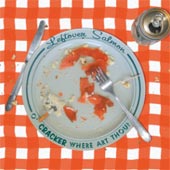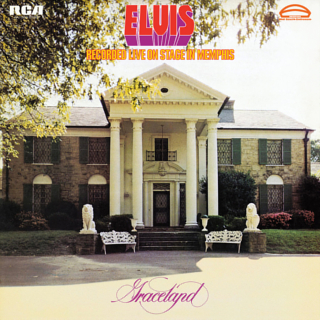Albums
- How Great Thou Art (Elvis Presley album), 1967
- How Great Thou Art (Willie Nelson album), 1996
- How Great Thou Art (The Statler Brothers album), 1969
- How Great Thou Art, a 1971 album by Burl Ives
- How Great Thou Art, a 1967 album by Pat Boone
"How Great Thou Art" is a hymn by Carl Boberg.
How Great Thou Art may also refer to:

O Brother, Where Art Thou? is the soundtrack album of music from the 2000 American film of the same name, written, directed and produced by the Coen Brothers and starring George Clooney, John Turturro, Tim Blake Nelson, and John Goodman.

O' Cracker Where Art Thou? is a compilation album containing bluegrass versions of Cracker songs. The songs are played by two members of Cracker, David Lowery and Johnny Hickman, with musical accompaniment by Leftover Salmon.

The Best of Dolly Parton is a compilation album by American singer-songwriter Dolly Parton. It was released on November 9, 1970, by RCA Victor. The album was produced by Bob Ferguson. It includes some of Parton's early hits, a few non-single album tracks, and two previously unreleased tracks. The album peaked at number 12 on the Billboard Top Country Albums chart. The single, "Mule Skinner Blues " peaked at number three on the Billboard Hot Country Songs chart and earned Parton a nomination for Best Female Country Vocal Performance at the 13th Annual Grammy Awards. The album was certified Gold by the RIAA on June 12, 1978, for sales of 500,000 copies.

How Great Thou Art is the ninth studio album by American singer and musician Elvis Presley, released by RCA Victor in February 1967. How Great Thou Art is a gospel album with slow numbers on one side, and fast-paced numbers on the flipside. The album earned Presley a Grammy Award for Best Sacred Performance, while it became a Billboard top 20 pop hit and it appeared on the Top Country Albums chart on the top 10.
"How Great Thou Art" is a Christian hymn based on an original Swedish hymn entitled "O Store Gud" written in 1885 by Carl Boberg (1859–1940). The English version of the hymn and its title are a loose translation by the English missionary Stuart K. Hine from 1949. The hymn was popularised by George Beverly Shea and Cliff Barrows during the Billy Graham crusades. It was voted the British public's favourite hymn by BBC's Songs of Praise. "How Great Thou Art" was ranked second on a list of the favourite hymns of all time in a survey by Christianity Today magazine in 2001.

Elvis Recorded Live on Stage in Memphis is a live album by American singer and musician Elvis Presley, released by RCA Records in July 1974. It was recorded on March 20 of the same year at the Mid-South Coliseum in Memphis, Tennessee, Presley's hometown. The cover features a photograph of Presley's home, Graceland.

Dottie West Sings Sacred Ballads is a studio album by American country music artist Dottie West. It was released in July 1967 on RCA Victor Records and was produced by Chet Atkins. The album was West's sixth studio effort and only gospel music collection to be released during her career. The album did not spawn any singles nor did it reach positions on any national publication charts.

Double Trouble is the fifteenth soundtrack album by American singer and musician Elvis Presley, released by RCA Victor in mono and stereo, LPM/LSP 3787, in June 1967. It is the soundtrack to the 1967 film of the same name starring Presley. Recording sessions took place at Radio Recorders and at Metro-Goldwyn-Mayer studios in Hollywood, California, on June 28, 29, and 30, 1966. It peaked at number 47 on the Billboard 200.

How Great Thou Art is a collaboration album by country singer Willie Nelson and his sister, Bobbie Nelson.

Back in Baby's Arms is the thirteenth solo studio album by American country singer Connie Smith. It was released in October 1969 via RCA Victor and contained 11 tracks. The disc contained a mixture of both new recordings and cover versions of previously-recorded material. Back in Baby's Arms reached the top 20 of the American country albums chart in 1969 and received a four-star rating from AllMusic.

The Best of Connie Smith Volume II is a compilation album by American country singer Connie Smith. It was released in March 1970 via RCA Victor and contained ten tracks. It was the second "Best Of" compilation released by the RCA Victor label that featured Smith's musical output. The disc compiled Smith's most popular singles between 1967 and 1969. The album reached the top 30 of the American country albums chart following its release. Also included was two new recordings. Of these new recordings, one was released as a single in 1969. Titled "You and Your Sweet Love", it reached the top ten of the country singles chart.

Amazing Grace: His Greatest Sacred Performances is a two-disc compilation of studio master recordings by Elvis Presley, released in 1994 on RCA Records and certified double platinum by the RIAA on July 15, 1999. The release also includes a booklet with session details and an essay by Charles Wolfe.

Clambake is the sixteenth soundtrack album by American singer and musician Elvis Presley, released by RCA Victor in mono and stereo, LPM/LSP 3893, in October 1967. It is the soundtrack to the 1967 film of the same name starring Presley. He entered RCA Studio B in Nashville, Tennessee on February 21, 1967 for Recording sessions for his twenty fifth film. Supplemental material sessions took place on September 10 and 11, 1967. It peaked at number 40 on the Billboard 200.

Psalm 8 is the eighth psalm of the Book of Psalms, beginning and ending in English in the King James Version (KJV): "O LORD, our Lord, how excellent is thy name in all the earth!". In Latin, it is known as "Domine Dominus noster". Its authorship is traditionally assigned to King David. Like Psalms 81 and 84, this psalm opens with a direction to the chief musician to perform upon the gittit or gittith, which either refers to a musical instrument, a style of performance, or alludes to persons and places in biblical history.

Be Still My Soul is an album by Abigail.
"Somebody Bigger Than You and I" is a song written by Johnny Lange, Hy Heath and Sonny Burke. It is known as a gospel standard.
Where No One Stands Alone may refer to:
Common Thread is a studio album released by the country/gospel group The Oak Ridge Boys. The album was released on May 24, 2005.
Then Sings My Soul may refer to:
"I May Never Pass This Way Again" is a popular song, written by Murray Wizell and Irving Melsher. Perry Como performed the song on his TV show in November 1957, but it was first a hit for Robert Earl in the UK, where it reached No. 14 in 1958.